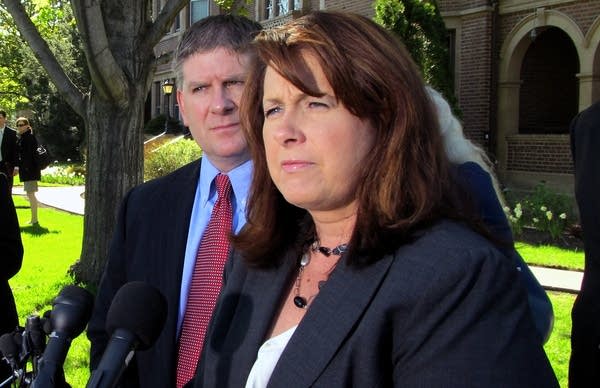Optimism is waning over reaching a budget deal

The Minnesota Legislature is another day closer to the end of the legislative session and lawmakers are still no closer to a budget deal with Gov. Dayton.
The House and Senate started passing some of their respective budget bills Tuesday night, even though Dayton says he won't sign them. The rhetoric between the two sides is also getting hotter.
Since the November 2010 election, DFL Gov. Dayton and GOP legislative leaders have been sparring over the best approach to close the projected $5 billion budget deficit. But all along, they said they were optimistic they could reach a deal.
Now with the end of the session in sight there is no deal, a special session appears almost certain, and the optimism is waning.
Create a More Connected Minnesota
MPR News is your trusted resource for the news you need. With your support, MPR News brings accessible, courageous journalism and authentic conversation to everyone - free of paywalls and barriers. Your gift makes a difference.
"How do you negotiate with somebody who is completely unreasonable?" asked Dayton during an appearance Tuesday on MPR's Midday program.
Dayton was touting his offer to scale back his proposed income tax increase on Minnesota's top earners, which Republicans promptly rejected.
On the radio broadcast, Dayton sharply criticized the Republicans' proposed budget cuts. He said the effects of those cuts would be higher property taxes, increased college tuition and the loss of health care coverage for 140,000 people.

"My remaining revenue would offset the need for some of those extreme cuts. They said, 'No, it's got to be our way or no way,'" Dayton said. "I'm not going to go all the way to their budget number. I got elected, too."
Republicans complained that Dayton isn't negotiating in good faith, and hasn't authorized his commissioners and agency heads to deal on the budget.
Despite repeatedly saying that sending budget bills for an all but certain veto is "the old way of doing things," Republicans now appear to be on that track. GOP Senate Majority Leader Amy Koch said Tuesday that Republicans in the House and Senate don't want to get caught in a time crunch when it comes to passing their budget plan.
"We will have to time things so we can get a budget moving. We have them teed up and ready to go," said Koch. But the Republicans decided to bring Dayton's revised tax plan to a vote on the House floor Tuesday afternoon.
It prompted a lively four-hour debate over the impact of raising taxes. Republicans, including Rep. Greg Davids of Preston, argued that raising taxes will harm the state's economy. He also said doing it this year would prompt pleas for more taxes in the future.
"Here we go again. Just raise it a little bit this year. Just a little bit more. No one will notice," said Davids. "Then the next year they raise it a little bit more. Members, now is the time to draw the line in the sand."
Rep. Terry Morrow, DFL-St. Peter, argued that the Republican budget plan would cause a brain drain in Minnesota. He said the budget cuts proposed for the state's public colleges and universities would lead to higher tuition, and that would force Minnesota students to choose colleges outside of Minnesota.
"That's why I'm in favor of a balanced solution," said Morrow. "If you want to talk about job creation, and you ignore the flip side of the job fillers -- the people who are going to work in those jobs -- you don't have a balanced solution that reflects the priorities of Minnesota."
The measure failed 73-60 with one Democrat, Rep. Gene Pelowski of Winona, joining every Republican in voting against it.
Dayton and lawmakers have until Monday to reach a budget deal. If they can't meet that deadline, the governor will have to call a special session. If a budget isn't in place by the end of the fiscal year, state government would shut down on July 1.
